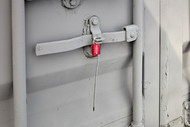Cable Seals' Role in Securing, Simplifying, and Sustaining Transportation and Terminals
Posted by Steve Diebold
Oil and gas companies serious about security are stepping up their game to make sure no one gets unauthorized access and messes with how things work. Nowadays, most petrochemical companies worldwide are choosing cable seals to lock things down because they're super strong.
These seals are like security guards for important valves, controls, tanks, and equipment at places where oil and gas are processed, stored, and loaded. They don't just stop people from getting in; they also prevent accidental openings. Plus, they make it really hard for anyone to mess with or steal stuff by sealing up big containers and trucks during transportation. These seals are a big deal for fuel and oil tank places and for moving things around. Luckily, American Casting & Manufacturing has a bunch of different cable seals you can check out in their catalog.
People used to think a simple, reliable seal that showed if someone messed with it would be enough for security. They often used metal or plastic band seals. But as things get more complicated and risky, safety and security rules and ways of doing things are getting more serious. The seals that just show if someone touches them are slowly being replaced by stronger seals that create a real barrier to keep things safe.
The oil industry takes risks and safety seriously, considering most safety concerns as potential threats to corporate assets, personnel, and the public. To proactively address these issues, oil safety management has introduced pull up cable closures, widely used in oil manufacturing facilities. This system acts as a preventative measure against accidents and dishonest behavior. It has also been found that using adjustable cable seals in strategic locations strengthens the sealing of pipelines transporting petroleum products.
At AC&M, we offer two types of pull-up cable closures: aluminum and steel cable seals. These come with various cable diameters and strengths, ranging from basic (1/16" diameter) to heavy-duty cables certified with ISO-17712. These seals are commonly used for transporting goods across international borders. You can customize the cable length to your needs, and there are different color options available. This approach enhances the overall security of the oil industry by minimizing risks and ensuring safe transportation of petroleum products.
The CL-99 model's engraved letters and numerals on its sturdy steel body are a big selling point. On the flip side, people often go for aluminum models because you can laser engrave extra information, like a barcode, on their bodies. In places like processing facilities and terminals, you'll usually find markings telling if valves are open or closed. This seal acts like a "lockout" to stop someone from messing with the valve unless they first remove it with a cutting tool. Essential control cabinets, holding switches or connections that need protection from interference, also use these seals. They're even found on doors or gates in places like petroleum stations or other restricted areas.
When petroleum and petrochemical containers are left alone in risky areas for too long, there's a chance they might get messed with or stolen. Tankers are especially at risk, even if they stop for just an hour. To deal with this, oil companies are now using security cable ties on barcoded cable seals, especially in areas where people steal petroleum. Most petroleum transporters in the U.S. make short-distance deliveries, so they're not often in danger. But using cable encapsulation is a smart move for the long-distance transportation of petroleum products.
Heavy duty cable locks are super useful, especially for rail carriages. Unlike regular vehicles, these rail tankers often stay in isolated and risky spots for a long time. Plus, having a bunch of goods in a rail car is risky if someone accidentally opens it, tries to mess with it, or steals stuff.
The cool thing about cable seals for tankers is that they can be put on super quickly and without much effort. But it can be a bit tricky to secure the valve or hatch on a tank vehicle or rail car because they're not all the same. Cable seals can easily fit into the corresponding holes in the hatches and valves. In some rare cases, plastic security seals might be able to handle the pressure.
Another way to use heavy duty cable locks is to protect cleaned and empty containers or tankers from theft. This way, you can check that the tank is clean, can hold the right stuff, and is in good condition before filling it up.
Contrary to what people might think, picking the right cable seal isn't hard. You just need to think about what suits your needs best. Of course, everyone's needs are different. Important things to consider include the length and thickness of the cable, the type of enclosure, and the labeling. Don't worry about figuring it out alone; you can get help from AC&M or check out information on our website to make a decision.
Explore Your Security Options with AC&M: Connect Today!
If you're curious about our seals or want to know how to use them for your oil or petroleum stuff, just hit us up. Some of the biggest oil and gas companies out there trust American Casting & Manufacturing. You can chat with an experienced pro about how to use the seals during regular work hours.
To get in touch with a seal expert at our main office and place where we make stuff, shoot an email to info@seals.com or give us a ring at 1-866-304-4289 in the United States or 516-349-7010 for international calls. And hey, if you're looking for sales or service outside the U.S., check out www.seals.com for the right info. We're here to help, so don't hesitate!

